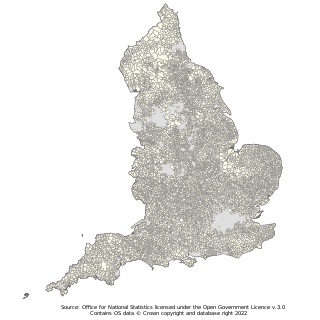National Vocational Qualifications (NVQs) are practical work-based awards in England, Wales, and Northern Ireland that are achieved through assessment and training. The regulatory framework supporting NVQs was withdrawn in 2015 and replaced by the Regulated Qualifications Framework (RQF), although the term "NVQ" may be used in RQF qualifications if they "are based on recognised occupational standards, work-based and/or simulated work-based assessment, and where they confer occupational competence".

A parish council is a civil local authority found in England, which is the lowest tier of local government. Parish councils are elected corporate bodies, with variable tax raising powers, and they carry out beneficial public activities in geographical areas known as civil parishes. There are about 10,480 parish and town councils in England. Parish councils may be known by different styles, they may resolve to call themselves a town council, village council, community council, neighbourhood council, or if the parish has city status, it may call itself a city council. However their powers and duties are the same whatever name they carry.

The British Computer Society (BCS), branded BCS, The Chartered Institute for IT, since 2009, is a professional body and a learned society that represents those working in information technology (IT), computing, software engineering, computer engineering and computer science, both in the United Kingdom and internationally. Founded in 1957, BCS has played an important role in educating and nurturing IT professionals, computer scientists, software engineers, computer engineers, upholding the profession, accrediting Chartered IT Professional (CITP) and Chartered Engineer (CEng) status, and creating a global community active in promoting and furthering the field and practice of computing.

Referendums in the United Kingdom are occasionally held at a national, regional or local level. Historically, national referendums are rare due to the long-standing principle of parliamentary sovereignty. Legally there is no constitutional requirement to hold a national referendum for any purpose or on any issue. However, the UK Parliament is free to legislate through an Act of Parliament for a referendum to be held on any question at any time.

In England, a civil parish is a type of administrative parish used for local government. It is a territorial designation which is the lowest tier of local government. Civil parishes can trace their origin to the ancient system of parishes, which for centuries were the principal unit of secular and religious administration in most of England and Wales. Civil and religious parishes were formally split into two types in the 19th century and are now entirely separate. Civil parishes in their modern form came into being through the Local Government Act 1894, which established elected parish councils to take on the secular functions of the parish vestry.

The Institute of Mathematics and its Applications (IMA) is the UK's chartered professional body for mathematicians and one of the UK's learned societies for mathematics.

The Institute of Chartered Accountants in England and Wales (ICAEW) is a professional membership organisation that promotes, develops and supports chartered accountants and students around the world. As of December 2023, it has over 208,000 members and students in 146 countries. ICAEW was established by royal charter in 1880.
A community council is a public representative body in Great Britain.
The Royal Town Planning Institute (RTPI) is the professional body representing planners in the United Kingdom and Ireland. It promotes and develops policy affecting planning and the built environment. Founded in 1914, the institute was granted a royal charter in 1959. In 2018 it reported that it had over 25,000 members.

The Institution of Engineering and Technology (IET) is a multidisciplinary professional engineering institution. The IET was formed in 2006 from two separate institutions: the Institution of Electrical Engineers (IEE), dating back to 1871, and the Institution of Incorporated Engineers (IIE) dating back to 1884. Its worldwide membership is currently in excess of 158,000 in 153 countries. The IET's main offices are in Savoy Place in London, England, and at Michael Faraday House in Stevenage, England.

Engineering New Zealand Te Ao Rangahau is a not-for-profit professional body that promotes the integrity and interests of members, the profession, and the industry. It seeks to "bring engineering to life" and has more than 22,000 members.
Legal executives are a kind of trained legal professional in certain jurisdictions. They often specialise in a particular area of law. A legal executive usually receives both vocational training and academic training.

A Measure of the National Assembly for Wales is primary legislation in Wales that is a category lower than an Act of Parliament. In the case of contemporary Welsh law, the difference with acts is that the competence to pass Measures was subject to 'LCOs' or Legislative Competence Order, which transferred powers to the Assembly by amending Schedule 5 of the Government of Wales Act 2006.
In the United Kingdom, a Chartered Engineer (CEng) is an engineer registered with the UK's regulatory body for the engineering profession, the Engineering Council. Chartered Engineers are master's degree qualified or must demonstrate equivalent masters level, work-based learning. The appropriate professional competencies must be demonstrated through education, further training and work experience. Significant experience is required which invariably spans several years of postgraduate professional practice. Demonstration of competence is defined in the UK Standard for Professional Engineering Competence, assessed through professional review of academic qualifications and professional development. Formal, non-formal and informal learning can be assessed. The title Chartered Engineer is protected in the UK under law by means of the Engineering Council’s Royal Charter and Bye-laws. As of 2019 there are approximately 180,000 engineers registered as a Chartered Engineer. Chartered Engineers are registered through Professional Engineering Institutions (PEIs) licensed by the Engineering Council which are relevant to their industry or specialism. The total process of formation of a Chartered Engineer including MEng typically spans at least 8-10 years, although 12+ years is not uncommon to satisfy all of the competency requirements.
The Association of International Accountants (AIA) is a professional accountancy body. It was founded in the UK in 1928 and since that date has promoted the concept of ‘international accounting’ to create a global network of accountants in over 85 countries worldwide.

The Institute of IT Professionals (ITPNZ) is a non-profit incorporated society in New Zealand. As New Zealand's ICT professional body, the IITP exists to promote education and ensure a high level of professional practice amongst ICT professionals. Before July 2012, IITP was known as the New Zealand Computer Society Inc (NZCS).
The National Association of Local Councils (NALC) is a membership organisation representing the interests of local councils in England. NALC works in partnership with county associations and the Society of Local Council Clerks to support, promote and improve local councils. One Voice Wales is the equivalent body covering community and town councils in Wales.

The Royal Society of Biology (RSB), previously called the Society of Biology, is a learned society and professional association in the United Kingdom created to advance the interests of biology in academia, industry, education, and research. Formed in 2009 by the merger of the Biosciences Federation and the Institute of Biology, the society has around 18,000 individual members, and more than 100 member organisations. In addition to engaging the public on matters related to the life sciences, the society seeks to develop the profession and to guide the development of related policies.
A clerk is a senior official of many municipal governments in the English-speaking world. In some communities, including most in the United States, the position is elected, but in many others, the clerk is appointed to their post. In the UK, a town or parish clerk is appointed by the town or parish council members. In almost all cases, the actual title of the clerk reflects the type of municipality they work for; thus, instead of simply being known as the clerk, the position is generally referred to as the town clerk, township clerk, city clerk, village clerk, borough clerk, board secretary, or county clerk. Other titles also exist, such as recorder and corporate officer. The office has existed for centuries, though in some places it is now being merged with other positions.











